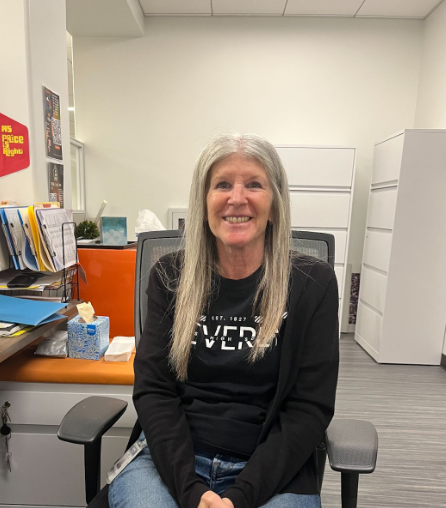Evan Minniti staff writer
When asked why he had pursued a career in physics, Albert Einstein explained that he wanted to understand the mind of God. For Kevin Bowers, physics provides students with a less lofty, but much more practical purpose: it can teach them how to think critically.
“We need more thinkers; we call this critical thinking. I like that physics has critical thinking built into it. There is very little memorization because we don’t need memorization anymore,” Bowers said. “We need more critical thinking.”
For more than 12 years, Bowers has taught physics at Beverly. In that time, hundreds of students have been under his wing. But many might not know that Bowers didn’t always want to be a teacher. In fact, for a few years after graduating high school, Bowers had no intention of ever stepping back in a classroom. Instead, he set out on a career in his uncle’s microchip company.
“One of the summers, probably junior to senior year, I worked for my uncle who owned a very small microchip company. This was maybe a 15 to 20 person company, not very large. But they actually made microchips from scratch all the way to the end,” Bowers said. “And as I was doing that, I realized I kinda enjoyed it. And by the end of senior year I started to get burned out on school. I was doing okay, I wasn’t failing or anything, I just couldn’t imagine sitting in another classroom for another four years after. I just wanted to be done with high school.”
At the time, Bowers was making $12 an hour right out of high school when the minimum wage was $4.25. (The equivalent today would be making $21.57.) Despite the high wage, Bowers now sees that he was not achieving any goals while working there.
“I didn’t even bother to apply to colleges. Basically just gave up on [high school], which freaked everybody out because I was on the honor roll but wasn’t applying to colleges and I didn’t have any real plan other then, ‘I’m gonna work for my uncle,’” Bowers explained.
After working there a few years, Bowers’ uncle retired and closed the business. Bowers found himself in a highly competitive world, while unemployed and with only a high school diploma. But Bowers had a few advantages, namely experience. He would eventually get a job at another microchip company, ATMI (today named Entegris). He also started attending community college.
“Then, after a couple of years I realized if I don’t get an actual degree, I’m gonna be stuck on the factory floor my whole life,” Bowers said.
With his background in engineering, Bowers decided to pursue a career in teaching. After getting his teacher credentials (at the age of 26) Bowers found work as a teacher in Payson, Arizona, before moving to Los Angeles to teach physics at Beverly.
“I taught two years in Arizona, at a really small town called Payson, Arizona. It has a population of like 10,000 people. I wanted to see what that was like. I found out very quickly that there were a lot of alcoholics, a lot of ex-cowboys. It was cool, but that really wasn’t the life for me,” Bowers said. “My friend said that he heard on the radio that they needed physics teachers in LA. I moved to LA and I’ve been at Beverly for… I think this is my 12th year? I think. I started in fall of ‘06, so I’ve been here a long time now.”
Bowers understands that most of his students probably won’t pursue careers in science. But he doesn’t care about that; what matters is that they have a new perspective on the world.
“There is definitely something [I enjoy] about helping people see what they might like. I say a lot in class, “I don’t care if you don’t become a physicist or get into science.” [One of the reasons] I like doing this is the logic and problem-solving. Trying to show how you solve problems in life, and not just math problems,” Bowers explained. “How do you rationalize something, or get organized and figure out what the real problem is, what are the possible solutions, and you try them out. You don’t need to be a math genius to know you need problem solving in life. It’s so important.”
Categories:
Physics teacher encourages kids to think critically
March 9, 2018
0
Donate to Highlights
$125
$1000
Contributed
Our Goal
Your donation will support the student journalists of Beverly Hills High School. Your contribution will allow us to purchase equipment and cover our annual website hosting costs.
More to Discover




























